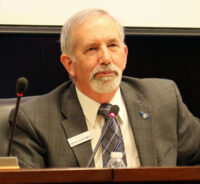Education Week kicks off Monday at the Statehouse as lawmakers begin to piece together the budgets that will drive public schools and higher education campuses in the year ahead.
Most of the action will take place in front of the Joint Finance-Appropriations Committee, the Legislature’s powerful budget-setting panel. During next week, lawmakers will conduct budget hearings for each of the state’s colleges and universities, as well as the public school budget.
This is one of the closest-watched weeks of the year in budget circles because education spending represents the largest general fund budget expense each year in Idaho. The public school budget alone accounts for about 48 percent of Idaho’s general fund spending. Once higher education funding is figured in, that total jumps to about 63 percent of state general fund spending.
Here are four storylines to follow next week:
Teacher pay

The biggest request for new spending from both Gov. Butch Otter and Superintendent of Public Instruction Sherri Ybarra goes to cover a fourth consecutive year of raises for teachers.
Otter called for setting aside $41.7 million for raises, while Ybarra is asking for $46.6 million.
Sen. Dean Mortimer, R-Idaho Falls, supports fulfilling the five-year plan to raise teacher salaries through the career ladder salary law.
“It’s an important effort for the Legislature to compensate them for the good and hard work they’re doing,” Mortimer said. “I absolutely support the fourth year (of raises this year) and doing the fifth year, as well as that master teacher portion when that comes to us next year.”
Mortimer serves as both chairman of the Senate Education Committee, and a member of JFAC, making him one of the most influential lawmakers when it comes to the intersection of education budget and policy issues.
Discretionary spending/ operations funding/ health care costs
One of the biggest differences between Otter’s budget proposals and Ybarra’s is the issues of discretionary spending, a funding source that many in education circles refer to as operations funding.
There’s about a $12 million overall difference between the two proposals, and much of it comes down to discretionary spending/operations funding.
Ybarra called for increasing operations spending by $19 million, while setting aside $7.2 million to cover health insurance costs for school employees.
Otter meanwhile, proposed keeping operations funding flat.
Rep. Wendy Horman, an Idaho Falls Republican who takes a lead role in writing the school budgets, says discretionary funding has become an important funding source for schools.
“It was a surprise to not see funding for health insurance increases and operation increases that we know schools will experience,” Horman said.
Guy Wangsgard, the Bonneville Joint School District’s chief financial officer, and Scott Woolstenhulme, Bonneville’s assistant superintendent, said their district uses operations funding for utilities, property and liability insurance, classroom supplies, health care costs and covering salaries and other benefits that the state doesn’t cover.
The Bonneville officials said they support providing funding for discretionary spending and earmarking specific dollars to offset rising health insurance costs.
“The more the state funds us in operations, the less we have to ask our local taxpayer to pick up tabs,” Woolstenhulme said.
K-3 literacy
Last year, the Legislature invested $11.4 million in a literacy intervention program designed to help students in grades K-3 who fall below grade-level reading benchmarks.
Otter wants to expand that program to the tune of $6.5 million, while Ybarra wants a smaller, $433,800 increase.
Mortimer didn’t endorse specific spending levels, but said the number of young students struggling to read is a huge issue that demands legislative attention.
“We need to implement more of a focus on K-3 literacy,” Mortimer said. “We have got to get some great policy decisions on K-3 literacy. “
Mortimer stopped short of unveiling a specific proposal, but said increased use of classroom technology for young students needs to be in the mix.
Higher education CEO
Otter wants a fundamental shakeup in the higher education system. He wants $769,500 to create a higher education chief educational officer. Otter said the new CEO would help streamline activities among the state’s four-year universities, avoid duplication of services and realize backroom costs savings that could be invested in other areas to help encourage more Idahoans to pursue an education after high school.
It’s still a pretty new proposal, but Ybarra endorsed the higher education CEO moments after Otter’s Jan. 8 State of the State address. This week, Mortimer also told Idaho EdNews he is endorsing the CEO proposal.
“I am in support of a person to coordinate — underneath the State Board of Education — our higher ed efforts to make sure we are recognize the cost savings,” Mortimer said. “We need to make sure we have a system that will allow the significant changes to occur that I believe we are going to see in higher ed over the next 10 years.”
Education Week schedule, at a glance (all events take place at the Idaho Statehouse)
Monday:
8 a.m., JFAC budget hearings: State Board of Education, community colleges
Tuesday:
8 a.m., JFAC budget hearings: Idaho State University, Lewis-Clark State College, Boise State University.
11 a.m. – 3 p.m., STEM Matters at the Statehouse (hands-on science, technology, engineering and math projects and activities)
Wednesday:
8 a.m., JFAC budget hearings: University of Idaho
Thursday:
8 a.m., JFAC budget hearings: public school support, Superintendent of Public Instruction Sherri Ybarra
9 a.m. – 1 p.m., School Choice Week activities
